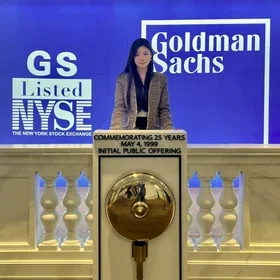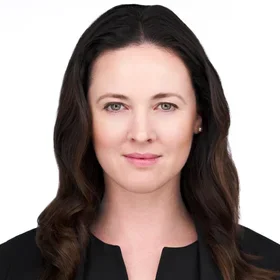Driven by a desire to help people achieve their personal goals through financial advising and excited about pursuing wealth management as a new career path, Navy veteran Drew Hanessian (’22SPS, Wealth Management) discovered Columbia University's Master of Professional Studies (M.P.S.) in Wealth Management on a friend's recommendation less than two weeks before the application deadline.
In a recent conversation, Drew shared insights he has gleaned in his financial advising journey and offered a firsthand perspective on what makes Columbia's M.P.S. in Wealth Management program unique.
What attracted you to Columbia’s M.P.S. in Wealth Management program?
I had been exploring wealth management as a new career path, seeking to pivot away from the contract management position I’d held since leaving the Navy. In the course of my networking and informational interviews, a friend of mine who had started an advisory practice in NYC told me about a new master’s program that Columbia was starting. I had set my sights on obtaining the CFP® certification, so it immediately piqued my curiosity.
Several things attracted me to the program. Columbia’s M.P.S. in Wealth Management program allowed me to use my remaining GI Bill® eligibility to obtain a master’s degree from an Ivy while fulfilling the CFP® education requirements, all while in San Diego supporting my wife’s continuing naval career.
I decided to apply within a few days of learning about the program, and I had 10 days left before the application deadline. It was a mad scramble, but it all worked out for the best!
What’s special or unique about Columbia’s M.P.S. in Wealth Management program? What value does a master’s in Wealth Management from Columbia bring?
Since it is primarily an online program (other than in-person residencies), I think there was some fear on the part of the first cohort that we wouldn’t benefit from the same level of interaction and connectedness as a fully in-person program. But it’s constructed with a focus on problem-based learning and group work, so you really have no choice but to become deeply involved with your classmates. To this day, the first cohort communicates via a shared WhatsApp group where we celebrate milestones, ask questions, and discuss industry developments. We also see each other in person whenever we can!
The true value of Columbia is hard to quantify, though some of our cohort know for a fact that prospects signed on as a direct result. The connections to other students, alumni, instructors, and guest speakers are invaluable. For me personally, the return on investment is nearly infinite, due to the GI Bill® and Columbia’s generous Yellow Ribbon Program for veterans.
What is your current role?
I am an associate advisor at a fee-only RIA (registered investment advisor) based out of the San Francisco Bay area called Ballast Point Financial Planning. Our clients tend to be early- to mid-career professionals with equity compensation, who are navigating many life’s major milestones like buying homes and starting families.
How would you describe the work you do in wealth management? What excites you about the field?
I help clients create and implement customized and comprehensive financial plans that reduce stress, optimize after-tax returns, and align their finances with their values.
By getting to know clients on a deep level, I can have a real impact on their lives. I enjoy seeing palpable relief in someone's face when I explain that they’re more secure than they thought, or getting an ecstatic email that our advice helped secure a higher salary. It’s exciting to see the direct impact I can have on others simply by doing what I enjoy: getting to know people and talking to them about their finances.
What was it like to transition from the U.S. Navy to wealth management?
While I was sure that leaving the Navy was the right thing for me, it took some searching for me to decide to pursue a career in what I had been personally passionate about for so long.
Eventually, I recognized that my greatest professional excitement came not from the tasks I’d been assigned, but from talking to coworkers about their personal financial struggles and offering what advice I could. Once I came to that realization, I embarked on a journey of exploration, talking to everyone I could, studying, interviewing, and obtaining credentials.
What’s your advice for students interested in pursuing a career in wealth management?
Get really good at listening! Yes, you have to be the expert. You absolutely have to have the knowledge of retirement plans, investing, estate planning, insurance, and tax. But when you’re in a meeting with a client, all of that is assumed. Resist the urge to demonstrate your skill and acumen right away. Focus on the client and their hopes, dreams, and fears. Understand them and everything else will fall into place.
You are a founding donor of the Wealth Management Advancing Diversity Fellowship Program. Could you talk about this fellowship and why you decided to support it?
The fellowship is about giving a leg up to advisors from diverse backgrounds. People want advice from those who have walked in their shoes and lived in their communities. Historically, the wealth management industry has lacked diversity, and thus many communities lack financial experts to whom they feel they can turn. This fellowship is a small step in the right direction, and I’m proud to be a part of it.
About the Program
A 16-month online program with asynchronous instruction, specially designed to accommodate working professionals, Columbia University’s Master of Professional Studies in Wealth Management program is taught by distinguished faculty with deep, applied experience in their respective fields. Additionally, it is a CFP Board Registered Program designed to help students meet the educational requirements for CFP® certification.
GI Bill® is a registered trademark of the U.S. Department of Veterans Affairs (VA). More information about education benefits offered by VA is available at the official U.S. government Web site at http://www.benefits.va.gov/gibill.


